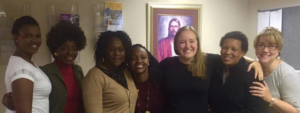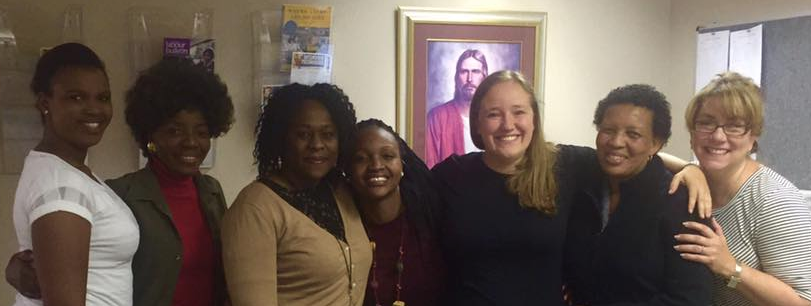 The Mormon Women’s Oral History Project is based at Claremont Graduate University and seeks to build an archive of ordinary Mormon women’s stories. Claudia Bushman – the founder of the project states:
The Mormon Women’s Oral History Project is based at Claremont Graduate University and seeks to build an archive of ordinary Mormon women’s stories. Claudia Bushman – the founder of the project states:
“If we want to live forever in the minds and annals of the earth, if we want other women to be represented in the future we have to leave a record.”
Liz Johnson joins me for this discussion about what she has discovered as an interviewer of women throughout the world. We discuss whose stories should count in Mormon history; how we empower women to tell their own stories with confidence, authority and authenticity; and what binds women around the world in this experience called Mormonism?


While living in the UK (I am your dreaded American) and serving with a British relief society president, our presidency was asked to contribute photos of sisters throughout Great Britain engaged in gospel themes to be used for a book project (from the Church). We gathered and sent all kinds of photos of these wonderful women and the ways in which they served there. When the book eventually came out, it had two- TWO!- photos of sisters from Great Britain in it. Most photos were of members from the US, centered in California, Utah, Idaho, and Arizona. So, while I was trying to be a part of a bigger collective and be inclusive of sisters throughout Great Britain and the world, I, we, got completely shot down.
How exactly do we GET the church to think “outside of Salt Lake City” and actually include the rest of the world? It is very disheartening to WANT to help the church change but have no power to do it. How exactly are we to gain the power to do it? I blog, I tell my story. So what? It changes little.
Hi Duck,
I’ve been thinking about your question for a few days and I don’t have any good answers. On the one hand, I have tried to shift my thinking away from “the church” being the top brass in SLC and towards “the church” being the membership on a whole, but that’s difficult to do when we have such a top-down, corporate structure. I think that culture affects policy, but that policy affects culture, so there has to be a change on both levels for things to really move. I’m also of the mind that great things come to pass by small and simple things, so doing your best to raise your voice where you can is huge. It might not feel huge, but the more people do it, the louder it gets. Best wishes!
Thank you, Liz, for your thoughtful consideration and answers to my questions. You are right, the church is each of us. As we move forward seeking, with the Lord’s help, to change things for the good, it will happen.
My problem is it is most times hard to wait for the change to happen, I want them to happen now. I have to believe in the tiny steps forward and then, before you know it, changed has been effected… hopefully! (Kind of like the fall of the Berlin Wall… Never thought it would happen in my lifetime, and then it seemed to fall overnight… And, I was even in Europe when it happened, who knew?!!)
Thank you, again, for your kind support. Loved your interview and your calm, yet passionate, voice of reason. Happy day!
Love, always, Duck
Liz if you have contacts in South Africa there is a story that needs to be recorded, if it hasn’t already. My parents were mission presidents (yes, I include my Mother in that) in Johannesburg, South Africa from 1984-87. The cook/housekeeper worked at the Mission Home for several mission presidents before and after my parents. My mother became very good friends with her and insisted she be put on the church’s employee benefit/retirement plan. I believe she eventually quit because of a bad experience with a mission presidents family. She did eventually get baptized. Her story is truly fascinating and I have always thought it would make a fantastic book. Perhaps her story has been recorded, in which case I would love to get it. How could I find out?
Hi Laura, I don’t know if we interviewed her, but I’d love to find out! You can email me at mormonwomenohp(at)gmail(dot)com.
Thank you for your thoughts, Liz. I appreciate the work you are doing to allow LDS women of all backgrounds to voice their stories. I am a huge advocate of authenticity in all aspects of our personal stories and try to be very intentional in my inclusion of all within and without the church. I had a thought though while I was listening to the podcast. I felt, as I often do as a born and bred Utah Mormon – who in many ways does fit “the mold”, that members outside of that often shame me and judge me for my story. And as you were talking about being a BYU baby who checked off many of “the boxes”, you groaned as if you were ashamed of that. Perhaps that is an incorrect assumption. But the host also carried a tone of mild distain toward those whose stories evidently “fit the mold.” I know you are trying to help those who feel marginalized and whose stories don’t “fit the mold” feel more comfortable. Yet I firmly believe there is a way to do that without being negative or shaming of anyone’s story – including the Utah Mormon who was born in the covenant, who faithfully lived the standards of the church as a youth, who served a mission, etc. I believe we should teach and strive for the ideal as members, whatever our background, AND be okay owning our past, no matter how rocky or colorful. As a church culture we need to anxiously work toward to be more loving and accepting to the vast majority who feel like outsiders. But let us all, whatever our stories, strive to do it without shaming the other.
I agree with you, I, too, heard the disdain in the voice of the interviewer. It gets really annoying when people put down Utah members of the Church, as if all are what they claim we are.
I don’t think Liz felt shamed at all. We were have fun with the cliche of being a BYU Baby. No disdain just a bit of teasing.
You both may have known you were teasing, listeners did not. It is clear how much you dislike Utah mormons. Maybe we dislike new Zealand mormons. And, maybe you lost some listeners.
Steady on there Duck! When did I ever say that I disliked Utah Mormons? A chuckle is not disdain!
You often make snide remarks about Utah mormons in your podcasts, you say it often in your patheos blog. Please don’t pretend that you don’t. You have made it abundantly clear to Mormons who live in Utah that we all come from privilege, or that we have this too easy, or we think everyone should be like us. That may be true of some Utah mormons but is not true of all mormons who come from Utah. A listener to your podcast should not be made to feel (s)he is less than because of place of living. You are fiercely loyal to your Maori heritage and would hate it if people podcast about the Maori and disparaged them. So please do Utah mormons a favor and treat them like you want your Maori background treated. Du bist nicht immer nett zum allen.
I don’t make snide remarks about Utah Mormons. I make pointed comments about the problem with Utah Mormon culture that as someone who is subject to its excesses I have no power to control or manage. It comes to New Zealand and we have deal with it like its come from Jesus. So yeah, I get to point that out because its mischievous and needs to be called out. But your criticism is like telling me I hate all males because I dislike patriarchy. Or I hate America because I don’t like American cultural imperialism. I’m not required to love the dominant Utah Mormon culture in order to love Utah (which I do). If you are subject to Maori culture and its problems as a patriarchal or a language or a cultural system that is imposed upon you through your religious worship then by all means critique it!
Hi Tara,
Thanks for your comment. I do think that I feel some discomfort with having ticked all of the boxes, especially when I’m trying to share the stories of women who are very much outside the mold, but I hope it’s not from any shame I have from my own story, but rather my own insecurity at being the person to amplify these other voices when I have so much privilege within the church. I do think that every story matters, but that one story is often told and heard more often than the others, and so I feel some dissonance in very much identifying with the common story while trying to make room for the many others. I’m not trying to shame people who fit the mold, but rather validate and honor the broad spectrum of Mormon experience.